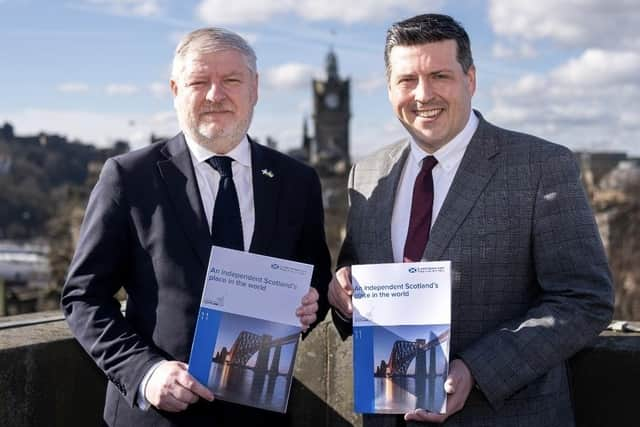An outward-looking, sovereign member of the international community - Angus Robertson


The new publication entitled “An independent Scotland’s Place in the World” gives a comprehensive overview of how Scotland can be a trusted neighbour and ally as well as a good world citizen.
From the off independence will mean that Scotland takes its place in the international community alongside 193 other United Nations member states. We will be able to be part of the European Union, as was the democratically expressed wish of Scotland in 2016, and as a NATO member state working with our allies, including northern European neighbours Sweden and Finland.
Advertisement
Hide AdAdvertisement
Hide AdIndependence would also mean that Scotland gets to determine the type of state it wants to be on that world stage – one that acts based on its values and principles, promotes human rights and development and builds partnerships with other countries and international organisations to address global challenges. An independent Scotland would be a good global citizen working towards peace and security in the interests of Scotland’s people and everyone else.
The defence and security of its people is the first duty of every independent country’s government. Occupying one of the most geopolitically important parts of the world – reaching out into the North Sea and the North Atlantic – Scotland’s contribution to global security will be significant, too.
An independent Scotland would have its own armed forces, supported by a modern contract for personnel and strong support for veterans. Decisions on future forces capability would be informed by a comprehensive, expert-led Defence and Security Review. This would ensure that planning and capability were responsive to the threat environmental and geopolitical challenges in play at the point of independence.
This Scottish Government would make it a cornerstone of defence policy that an independent Scotland would only participate in overseas military operations that are lawful, approved by Scottish Ministers, and authorised by the Scottish Parliament.
Advertisement
Hide AdAdvertisement
Hide AdFurthermore, Scotland should play its part in global nuclear disarmament, removing nuclear weapons from Scotland in the safest and most expeditious manner possible following independence.
With the full powers of independence, this Scottish Government would commit to meeting the UN target of 0.7 per cent of Gross National Income on official development assistance (ODA), and establish a new ministerial portfolio dedicated to international development. An independent Scotland would also be able to enshrine the 0.7 per cent commitment in law. This would give Scotland a sizeable aid budget with which to make an impact in the world’s poorest countries.
We would continue to be world leaders in the climate space, building on the globally recognised contribution Scotland has made to climate justice, biodiversity and renewables.
Scotland’s overseas offices and organisations have a track record of delivering billions of economic benefits to the country. With independence, we can expand this, showing our nation as a key trade and investment partner for more nations the world over.
Advertisement
Hide AdAdvertisement
Hide AdThe full paper can be read on the Scottish Government’s website, alongside the previous ten papers. I encourage all those interested to delve into this topic and engage in discussions about the future of Scotland at home and in the world.
Angus Robertson is the SNP MSP for Edinburgh Central and Constitution, External Affairs and Culture Secretary